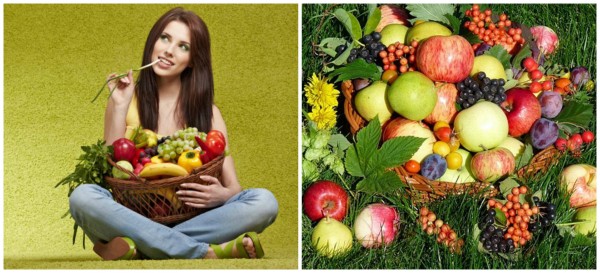We all know that fruits are an essential source of many vitamins and other beneficial substances. This is why everyone tries to eat more fruit, and children are introduced to fruit purees as complementary foods from a very early age. But to get the maximum benefit from fruits, you need to eat them correctly. What does it mean? This means that everyone needs to know in what form and at what time it is better to consume fruits, so that all the beneficial substances from them are absorbed as well as possible and bring as much benefit to the body as possible.
We will tell you the basic rules for eating fruits, which will help you create your diet correctly. In addition, we will offer simple tips on fruit consumption for all occasions.
What is the best way to eat fruit?
Most of us are well aware that It is better to consume fruits in the form in which nature created them, namely, fresh. Most nutritionists support this idea. Fresh fruits contain a lot of substances that can be destroyed during heat treatment, therefore, they are much healthier than, for example, boiled or canned. For example, vitamin C is destroyed not only during the cooking process, but even from contact with air, so in order to get more of it, the fruit must be eaten raw and uncut.
Also, fruits that have been stored for a long time are not the healthiest. Turns out, long-term storage can lead to changes in the chemical composition of the pulp. That is why fruits that have been stored in refrigerators for a long time or were brought from afar cannot be compared in their usefulness to those freshly picked from the branch. Of course, in winter we don’t have much choice, and we buy imported exotic fruits or local ones that were stored in special warehouses. By the way, even in such a situation it is worth buying local fruits, since ripe fruits contain much more vitamins, and exotic ones are usually picked while still green so that they ripen along the way.
There is another interesting question: is it better to eat fruits whole or cut? Cut up fruit is definitely more convenient to eat, and you can also make interesting fruit salads from them. But Chewing whole fruit is much healthier. As we already said, some vitamins are better preserved in whole fruits. In addition, chewing helps clean teeth from plaque and even, and stimulate intestinal motility and the release of enzymes. Intensive chewing also helps remove wax from the ears.
Are there situations where fresh fruit is not desirable? Yes, for some diseases of the gastrointestinal tract they can be harmful. Breastfeeding mothers should not eat fresh fruit.
When is the best time to eat fruit?
Different types of food are digested differently at different times of the day. Many people know that foods rich in carbohydrates are best consumed in the morning, but foods are much healthier in the evening. When is the best time to eat fruits to get all the health benefits from them?
In fact You can eat fruit at any time of the day. They are most often recommended for breakfast or as light snacks throughout the day. Don't eat very sweet fruits for dinner, but there may be exceptions to this rule. This rule is more relevant for overweight people, for whom overly sweet fruits are not recommended at any time, not just in the evening.
 Whatever time of day you decide to eat fruit, you must remember that it is better not to combine it with other foods. You can eat some fruit about half an hour or 40 minutes before your main meal. Then the fruit will have time to leave the stomach before eating and will greatly increase your appetite. If you decide to eat fruit as a dessert, then it is better to wait at least half an hour after eating and only then eat fruit.
Whatever time of day you decide to eat fruit, you must remember that it is better not to combine it with other foods. You can eat some fruit about half an hour or 40 minutes before your main meal. Then the fruit will have time to leave the stomach before eating and will greatly increase your appetite. If you decide to eat fruit as a dessert, then it is better to wait at least half an hour after eating and only then eat fruit.
Mixing fruits with other dishes can lead to disruption of food absorption and poor digestion. When mixed with other products, they can cause increased gas formation and, as a result, bloating.
How much fruit should you eat?
Most people rightfully consider fruits to be very healthy, so they try to eat as much of them as possible. But “more” doesn’t always mean “better.” In fact, when consuming fruits, it is very important to take into account the individual tolerance of this product to the human body.
What kind of portability is this and how to determine it? Most fruits contain a lot of fiber and other components that stimulate the gastrointestinal tract. If you eat more of them than the body can safely tolerate, diarrhea may begin, which will lead not only to the loss of all the beneficial substances obtained from the fruit, but also to dehydration, loss of electrolytes and valuable components from other types of food. Therefore, it is very important to know how much fruit you can eat without negative consequences for yourself and try not to exceed this dose.
 There is another equally unpleasant “side effect” from eating this type of food - constipation, which can occur, for example, after eating pomegranate. Therefore, when choosing fruits for your diet, you need to be careful and take into account all the characteristics of your body. If you choose the right fruits and their quantity, then they will not do any harm, but will help you get all the necessary and other equally important substances.
There is another equally unpleasant “side effect” from eating this type of food - constipation, which can occur, for example, after eating pomegranate. Therefore, when choosing fruits for your diet, you need to be careful and take into account all the characteristics of your body. If you choose the right fruits and their quantity, then they will not do any harm, but will help you get all the necessary and other equally important substances.
How to eat fruits out of season?
As we have already said, local fruits are the healthiest during their ripening season. If you buy only fresh fruit from orchards, you can be sure that they are ripe and that they have not been treated with special chemicals to extend their shelf life. But in our climate this, unfortunately, is impossible. Therefore, sooner or later you will have to buy an imported exotic fruit or a properly preserved local one.
What fruits are best to buy in winter to get maximum benefits and minimum harm? In winter, a variety of citrus fruits are distinguished by their high quality and high content of vitamins. The leaders in popularity are tangerines, which are brought from relatively nearby areas. They ripen in late autumn, so significant processing for their transportation and storage is not needed, and we have the opportunity to receive this product almost in its “pristine form.” You can also buy kiwi, these are rich fruits that also ripen in the fall.
 But it is better to avoid pineapples, mangoes, papaya and other exotic fruits. Sometimes you can buy them as a treat, but remember, the likelihood of purchasing an unripe or spoiled product is very high. In addition, such products are often subject to excessive chemical processing for better transportation and storage. Most likely, such a fruit will not have a high content of vitamins, and its taste will be noticeably different from the natural one.
But it is better to avoid pineapples, mangoes, papaya and other exotic fruits. Sometimes you can buy them as a treat, but remember, the likelihood of purchasing an unripe or spoiled product is very high. In addition, such products are often subject to excessive chemical processing for better transportation and storage. Most likely, such a fruit will not have a high content of vitamins, and its taste will be noticeably different from the natural one.
Several rules for eating fruits (Video)
It is best to eat fresh foods. If it is not possible to purchase “seasonal fruit,” you can choose frozen, but not canned. In such situation It’s better to buy the fruit during the ripening season and freeze it yourself. Canned fruits contain too much sugar and other not very healthy substances.
It is better to eat fruit in the morning or before meals. You should not eat foods on a full stomach, as this can lead to digestive problems. A very good option for breakfast is citrus fruits. They give a great boost of energy and lift your mood throughout the day. You can eat some kiwi - they contain 5 times more vitamin C than oranges.
To improve digestion, you can eat apples before meals. Apples increase the secretion of gastric juice and promote more complete digestion of food. You need to eat them either half an hour before meals or after. It is very important to chew the fruit thoroughly. You can eat grapes or raisins as a dessert.. You can eat them no earlier than three hours after meals and in no case before bedtime.
“Heavy” high-calorie fruits, such as bananas, are best eaten in the afternoon, for example, as an afternoon snack, but not before bed. During the afternoon snack, the body is already ready to digest heavy food; until the evening it will just cope with bananas. But as a dinner for those who don’t like plums. They have a very good effect on intestinal motility; if you lead a sedentary lifestyle, then two plums as a late dinner will be an excellent option.


